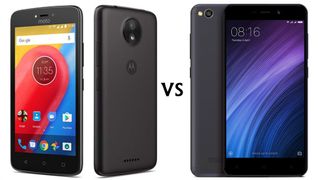Moto C vs Xiaomi Redmi 4A: a quick comparison
Which is better for Rs 5,999?

Lenovo-owned Moto has launched the Moto C, which is the company's cheapest offering in its smartphone portfolio. Priced at Rs. 5999, the Android smartphone is targeted at consumers who plan to switch their feature phone with a smartphone.
However, the Redmi 4A from Xiaomi is already ruling the Rs. 5,999 price segment with its alluring value for money features. We have pit both the smartphones against each other and here’s an overview to help you choose the right one for you.
Design and display
Redmi 4A's non-removable back surface is entirely made up of plastic that has a smooth metallic coating on the top. It does not look cheap like most other budget phones, in fact, the handy dimensions feel perfect for one handed usage. The camera and flashlight are flushed into the back surface without disturbing the uniformity.
Moto C comes with a standard plastic removable back that we have been seeing Moto's entry level smartphones for years. The back has a slight camera bump which is prone to scratches if used haphazardly.
Overall, Redmi 4A trounces Moto C in the design and build department with its premium metallic finish and ergonomics. But if you prefer a funky looking phone that comes in peppy colors, then you can consider the Moto C without a doubt.
Redmi 4A features 5-inch IPS capacitive touchscreen with a screen resolution of 1280 x 720 pixels. There is nothing to complain about the display, as brightness levels are adequate and color reproduction is also good.
Moto C sports a 5-inch TFT capacitive touchscreen with a screen resolution of 480 x 854 pixels. The display is certainly inferior to the one found on Redmi 4A owing to its sub-par display resolution.
Get daily insight, inspiration and deals in your inbox
Sign up for breaking news, reviews, opinion, top tech deals, and more.
Performance and storage
A quad-core Qualcomm Snapdragon 425 processor that consists of four Cortex-A53 cores clocked at 1.4GHz each coupled with Adreno 308 GPU powers Redmi 4A. It handles day to day tasks with an ease; however, you may encounter occasional lag when multitasking. It packs 2GB RAM and 16GB internal storage.
Moto C is powered by a quad-core Mediatek MT6737M chipset that comprises of four Cortex-A53 cores clocked at 1.1GHz each coupled with Mali-T720MP2 GPU. It comes with 1GB RAM and 16GB internal storage.
Although the Redmi 4A looks much more mighty on paper, there is no major difference seen in basic usage. The software optimisation and stock Android on the Moto C makes up for the lesser amount of RAM on the phone. We have not tested the Moto C yet, so it’ll be too early to comment on the performance.
Camera
Redmi 4A's comes with a 13MP sensor on the rear with a 5-element lens, f/2.2 aperture, PDAF, and HDR, and LED flash. On the front, it sports a 5MP selfie snapper.
Moto C comes with a 5MP camera on the back with a LED flash and a 2MP camera on the front with front LED flash.
Having tested the Redmi 4A camera, we can say that the smartphone’s camera performance is at par with the standard set by phones of this range.
Battery, connectivity and software
On the connectivity front, both devices support 2G, 3G, 4G LTE, GPRS, Bluetooth and USB port for data transfer and charging. Sensors on Redmi 4A include Accelerometer, gyro, and proximity. On the other hand, Moto C just comes with an Accelerometer sensor.
A non-removable 3210 mAh battery fuels Redmi 4A, while the Moto C is backed by a removable 2350 mAh battery. Undoubtedly, the Redmi 4A fares well in the battery department with a much bigger cell baked at the back. However, Moto C’s replaceable battery is a plus for those who prefer using their smartphones for more than a year.
Redmi 4A runs on MIUI 8 based on Android 6.0.1 Marshmallow. Moto C runs on Android 7.0 Nougat.
Conclusion
You should pick Moto C if you need the latest OS that is rather simple and uncluttered compared to MIUI on Redmi 4A. Also, if you only like buying a phone from retail outlets, then Moto C is the best option available. Otherwise, Redmi 4A excels in every other department, and it should be your obvious pick any day.
